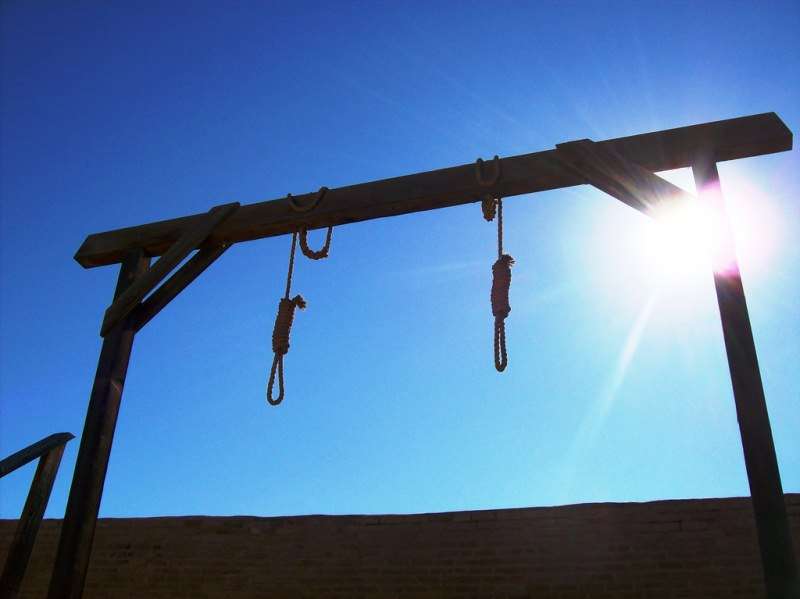Hanging Delayed is Hanging Denied: Abolish the Dysfunctional Death Penalty
Long delays and legal maladministration are further reason to dump capital punishment.


The July 16 decision by U.S. District Judge Cormac J. Carney declaring California's death penalty unconstitutional offered a stark assessment of the Golden State's dysfunctional capital punishment system. Judge Carney noted only 13 of the more than 900 people sentenced to death since 1978 have actually been executed—primarily because the average appeals process in a capital case takes "25 years or more" to complete. For example, Ernest Jones, the death row inmate whose lawsuit prompted Judge Carney's decision, waited nearly eight years for the California Supreme Court to hear his initial appeal. It took four years just for the state to provide him with an attorney to handle the appeal.
Judge Carney acknowledged "courts had thus far generally not accepted the theory that extraordinary delay between sentencing and execution violates the Eighth Amendment," which prohibits "cruel and unusual" punishment. But in accepting that theory now, Judge Carney joined a substantial body of death penalty jurisprudence from the British Commonwealth. While the United Kingdom, like all European Union members, forbids the death penalty within its borders, a group of British judges continue to oversee death penalty cases from the English-speaking Caribbean, where execution by hanging remains the statutory penalty for murder.
The Five-Year Rule
In 2008, a jury in the island nation of Trinidad and Tobago convicted Julia Ramdeen of the 2003 murder of Carlos Phillip. Phillip hired Ramdeen, a call girl, to organize a threesome with another woman. According to Ramdeen, Phillip arrived at her apartment for their rendezvous in a drunken and aggressive state. He grabbed her by the throat. She responded by hitting him in the head with a brick. A fight ensued. Ramdeen admitted to police she then repeatedly stabbed Phillip until he was dead.
Prosecutors presented an alternate theory, relying on a witness testifying under immunity. This witness claimed he, Ramdeen and another man lured Phillip to the apartment in order to rob him. The three ended up killing Phillip together and disposing of his body. The jury believed the witness, and Ramdeen and the other alleged conspirator received death sentences.
Ramdeen's appeal focused on whether the trial judge properly instructed the jury as to the law. In 2010, the Court of Appeal of Trinidad and Tobago dismissed the appeal and said Ramdeen's execution could proceed. Ramdeen made her final appeal in 2012 to the Judicial Committee of the Privy Council (JCPC), the London-based court which retains jurisdiction over criminal appeals from Trinidad and Tobago and eight other former British colonies in the Caribbean.
On March 27 of this year, a five-judge Board of the JCPC unanimously rejected Ramdeen's appeal of her conviction. Like the Court of Appeal, the Board found no legal error in the trial judge's jury instructions, concluding they "were clear, fair and appropriate." Nevertheless, the Board, by a vote of 3-2, commuted Ramdeen's death sentence to life imprisonment. Why? Because in the course of litigating the JCPC appeal, more than five years elapsed since the trial court imposed its death sentence. And under a 1993 JCPC decision, executing a person after that long a delay amounts to "inhuman" punishment, which is barred under Eighth Amendment-like provisions of the constitutions of Trinidad and Tobago and the other Caribbean nations where the Privy Council retains jurisdiction.
This five-year rule comes from a Jamaican case. Earl Pratt and Ivan Morgan were sentenced to death in 1979 for a murder committed two years earlier. After a number of delays—and three stays of execution—the JCPC heard Pratt and Morgan's appeal in 1993. By that point, the men had been in prison for 16 years.
A seven-judge Board of the JCPC commuted the death sentences. Lord Hugh Griffiths, writing for the Board, said any execution carried out more than five years after sentence was presumably "inhuman or degrading," and therefore unconstitutional:
There is an instinctive revulsion against the prospect of hanging a man after he has been held under sentence of death for many years. What gives rise to this instinctive revulsion? The answer can only be our humanity; we regard it as an inhuman act to keep a man facing the agony of execution over a long extended period of time.
The Pratt and Morgan decision immediately commuted more than 200 death sentences imposed by courts in Jamaica, Trinidad and Tobago, and Barbados. (Pratt was actually released from prison in 2007, after serving more than 30 years.) In the two decades since then, the Privy Council's five-year rule has effectively ground the death penalty to a halt in the English-speaking Caribbean. For instance, Trinidad and Tobago held its last execution in 1999, despite currently having approximately three dozen death row inmates. According to a 2012 Amnesty International report, only the Bahamas and St. Kitts and Nevis have managed to carry out any death sentences since 2000.
Is Abolition Preferable?
Ultimately, the death penalty has no place in a modern judicial system. Executions were meant to exact swift, brutal punishment against heinous criminals. But while hanging may continue to enjoy support among Caribbean governments, the American public has clearly lost its appetite for such brutality. Ninth Circuit Chief Judge Alex Kozinski recently observed California's use of lethal injection "is a misguided effort to mask the brutality of executions by making them look serene and peaceful." He said if states insisted on continuing capital punishment, they should stop sugarcoating it and employ "more primitive—and foolproof—methods of execution." He suggested, one hopes facetiously, a return to the firing squad.
As for swiftness, there was a time when a delay of a year or two would have been considered egregious in a death penalty case. Lord Griffiths noted in the Pratt and Morgan decision English law once required execution the day after conviction. Even as late as 1950, British executions took place within three to six weeks of sentence. That is no longer practical for any court system, much less one as backlogged as California's. While some reactionaries may continue to argue this is the fault of defendants and their lawyers seeking to delay justice, the truth, as both Judge Carney and the Privy Council know, is the courts are too overwhelmed to deal with death penalty appeals in an expeditious manner.
The Privy Council, in what might charitably be deemed an act of judicial desperation, simply made up the five-year rule out of thin air. The Pratt and Morgan decision offered no explanation for stopping the clock at five years rather than four, six, ten or any other number. Furthermore, the Pratt and Morgan Board severely criticized Jamaica's court system for exhibiting a level of dysfunction that mirrors California's today.
By contrast, the Ramdeen case involved no unusual delay or judicial maladministration. The five-year deadline only expired because the Privy Council chose to grant a discretionary appeal, which it then turned around and dismissed as baseless. The fact two judges dissented from the commutation of Ramdeen's death sentence—and dissents of any sort are unusual in Privy Council cases—suggests the majority may have engaged in anti-death penalty activism for its own sake.
Judge Carney's approach is much cleaner. He simply declared the death penalty unconstitutional without attempting to fashion an arbitrary time frame for completing the appeals process. His arguments may not survive appeal to the Ninth Circuit or the Supreme Court, but his detailed condemnation of California's death row dysfunction should not be ignored. Judicial abolition is the only practical solution to the interminable death row appeals process. Merely putting a clock on the death penalty, as the Privy Council has done, is not a satisfactory alternative. Adopting such an approach in the U.S. would only encourage prosecutors (and pro-death penalty judges) to take shortcuts with a defendant's constitutional rights to ensure any deadline is met.


Show Comments (84)